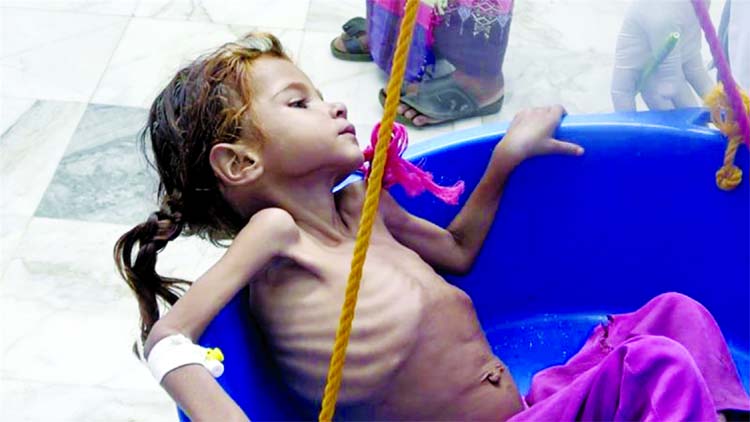
Al Jazeera News :
The United Nations humanitarian chief warns that Yemen is on the verge of widespread famine, with about half of the population completely relying on humanitarian aid for survival.
Addressing the Security Council on Tuesday, UN Undersecretary-General for Humanitarian Affairs Mark Lowcock said, “there is a clear and present danger of an imminent and great big famine engulfing Yemen.”
Lowcock told the UN’s most powerful body that this famine would be “much bigger than anything any professional in this field has seen during their working lives”.
He said that “the situation is now much graver” than when the world governing body last warned of a risk of famine at the beginning of 2017 and again last November, because “of the sheer number of people at risk”.
According to Lowcock, last month’s estimate that 11 million people could soon face “pre-famine conditions” actually stood closer to 14 million – about half of Yemen’s population.
Lowcock said last month that the worsening food crisis was in large part the result of an intensification of fighting around the key port city of Hodeidah. “Fierce clashes continue in Hodeidah, including intense fighting, shelling and air raids in Hodeidah City over the last several days,” Lowcock said. “Yemen is almost entirely reliant on imports for food, fuel and medicines,” Lowcock added. “And the available foreign exchange – from what little remains of oil exports, from money sent home by Yemenis out of the country, and from international assistance – has been simply inadequate to finance adequate levels of imports to support the population.” Fighting near Hodeidah has escalated since June 13 after the Saudi-UAE alliance launched a wide-ranging operation to retake the strategic seaport.
Hodeidah has been under the control of Houthi rebels since 2014, along with other coastal cities and much of northern Yemen. The city’s seaport was responsible for delivering 70 percent of Yemen’s imports – mostly humanitarian
aid, food and fuel – pre-2015. The Saudis have accused the Houthis, who reportedly generate $30m to $40m a month in revenue from the port, of using the port to smuggle in weapons from Iran.
At the beginning of 2017, the United Nations and its partners were able to provide aid to three million hungry Yemenis. Since then, assistance has been scaled up, reaching eight million people in September because of generous funding from donors, Lowcock said, but far below the 14 million people who may need it.
Lowcock said three conditions are required for famine to be declared: At least one in five households faces an extreme lack of food, more than 30 percent of children under the age of five are suffering from acute malnutrition, and at least two out of every 10,000 people are dying every day.
The United Nations humanitarian chief warns that Yemen is on the verge of widespread famine, with about half of the population completely relying on humanitarian aid for survival.
Addressing the Security Council on Tuesday, UN Undersecretary-General for Humanitarian Affairs Mark Lowcock said, “there is a clear and present danger of an imminent and great big famine engulfing Yemen.”
Lowcock told the UN’s most powerful body that this famine would be “much bigger than anything any professional in this field has seen during their working lives”.
He said that “the situation is now much graver” than when the world governing body last warned of a risk of famine at the beginning of 2017 and again last November, because “of the sheer number of people at risk”.
According to Lowcock, last month’s estimate that 11 million people could soon face “pre-famine conditions” actually stood closer to 14 million – about half of Yemen’s population.
Lowcock said last month that the worsening food crisis was in large part the result of an intensification of fighting around the key port city of Hodeidah. “Fierce clashes continue in Hodeidah, including intense fighting, shelling and air raids in Hodeidah City over the last several days,” Lowcock said. “Yemen is almost entirely reliant on imports for food, fuel and medicines,” Lowcock added. “And the available foreign exchange – from what little remains of oil exports, from money sent home by Yemenis out of the country, and from international assistance – has been simply inadequate to finance adequate levels of imports to support the population.” Fighting near Hodeidah has escalated since June 13 after the Saudi-UAE alliance launched a wide-ranging operation to retake the strategic seaport.
Hodeidah has been under the control of Houthi rebels since 2014, along with other coastal cities and much of northern Yemen. The city’s seaport was responsible for delivering 70 percent of Yemen’s imports – mostly humanitarian
aid, food and fuel – pre-2015. The Saudis have accused the Houthis, who reportedly generate $30m to $40m a month in revenue from the port, of using the port to smuggle in weapons from Iran.
At the beginning of 2017, the United Nations and its partners were able to provide aid to three million hungry Yemenis. Since then, assistance has been scaled up, reaching eight million people in September because of generous funding from donors, Lowcock said, but far below the 14 million people who may need it.
Lowcock said three conditions are required for famine to be declared: At least one in five households faces an extreme lack of food, more than 30 percent of children under the age of five are suffering from acute malnutrition, and at least two out of every 10,000 people are dying every day.

